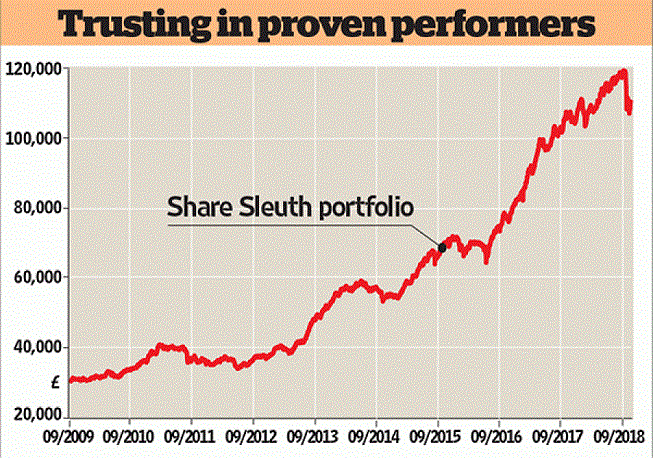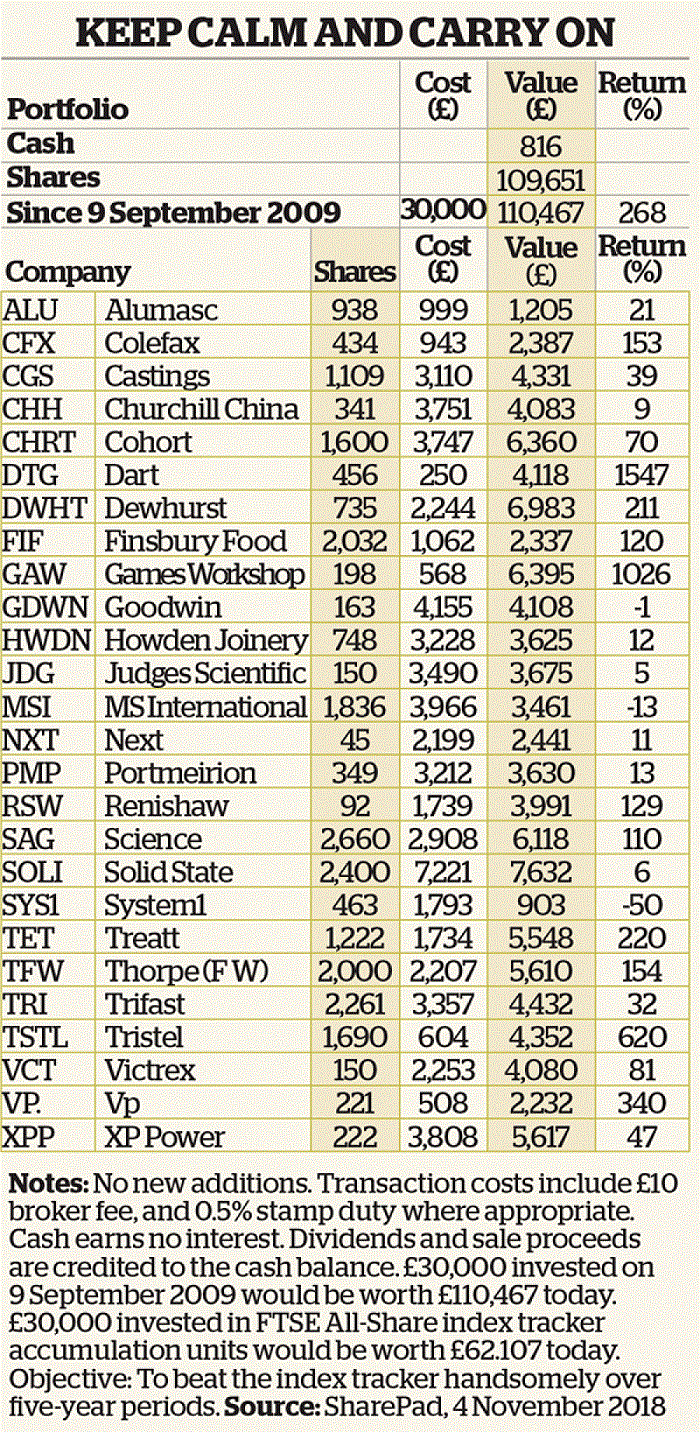Share Sleuth might buy this share and sell another, but which ones?
22nd November 2018 11:31
by Richard Beddard from interactive investor
Companies analyst Richard Beddard is wary about predicting the future, preferring instead that the good companies he picks find a way to prosper. Here's what may be in and out this month.

This article was written in November for the December 2018 print edition of Money Observer. Market data and share prices are likely to have since changed.
FW Thorpe and Quartix, both profiled in my Share Watch column, expose a tension in my investing process, which I described in last month's Share Sleuth column.
On one hand I believe there are significant risks in owning shares in these companies, and I should be cautious about recommending them.
In FW Thorpe's case, demand for lighting systems may fall. The business has received a boost in recent years as manufacturers, logistics companies, shops, hospitals and local councils have rushed to install LED lighting, which provides better lighting at lower cost (over the lifetime of the lighting fixture) than outdated fluorescent systems. But the company believes the boost has peaked, and since lighting systems last a decade and more, some of the customers who might otherwise have replaced their lighting in coming years will already have done so.
At Quartix, the risk is that something of long-term significance is putting the skids on growth. Two years of pedestrian performance by the company's standards – the current year and the year to December 2017 – are not just growing pains as it builds scale in the USA.
On the other hand, my process stops me from letting one single factor outweigh the others. As I explained last month, I score each of five factors about a company independently. I seek businesses that are profitable, adaptable, resilient, equitable and cheap.

Source: interactive investor Past performance is not a guide to future performance
Impressive record
Neither company is obviously cheap, so they will have to perform well to be worth the asking price. But I really admire the managers of Quartix and FW Thorpe and believe they have the interests of shareholders, staff and customers at heart (they are equitable).
Their historical records in terms of profitability and growth are very impressive (they are profitable). They have developed products that stand out from the crowd, and their strategies demonstrate that they are innovating to keep it that way (they are adaptable).
Of the four factors that relate to the quality of the businesses (as opposed to their market value), FW Thorpe and Quartix only fail to achieve a maximum score for resilience. Although I think their strategies address the risks they face, and I certainly couldn't tell them what to do better, I am not as confident as I would like to be that they will prevail.
You may well ask why I am so even-handed. Surely sometimes one factor can outweigh the others if I feel strongly enough about it?
To explain why I compartmentalise things this way, let me ask you what you think of Alan and Ben after reading these two descriptions: Alan: intelligent, industrious, impulsive, critical, stubborn, envious; Ben: envious, stubborn, critical, impulsive, industrious, intelligent.
This is from a famous psychological experiment (the Asch Experiment). The two lists are identical, they are just presented in the opposite order. But if you are like me, you will have formed a more favourable impression of Alan than Ben, because you have been influenced by the biggest, most obvious trait, the first in this case. Psychologists call this the "Halo effect".
My fears for the futures of these two companies, the threats to their resilience, loom largest, but even though sometimes my prejudices may be proved right, generally I think it is best not to let those fears cast a pall on the investment. I have a second reason for being wary about predicting the future: I don't think I am any good at it. My modus operandi is to find good companies I trust, and let them worry about finding a way to prosper.
Three of the companies profiled in December's Share Watch column are in the Share Sleuth portfolio. They are Alumasc, Renishaw and FW Thorpe. The fourth, Quartix, may be joining it soon. That would require me to expel a share, because Share Sleuth only has £816 in cash. The most likely candidate for expulsion is MS International, which has the lowest score in the portfolio.

These articles are provided for information purposes only. Occasionally, an opinion about whether to buy or sell a specific investment may be provided by third parties. The content is not intended to be a personal recommendation to buy or sell any financial instrument or product, or to adopt any investment strategy as it is not provided based on an assessment of your investing knowledge and experience, your financial situation or your investment objectives. The value of your investments, and the income derived from them, may go down as well as up. You may not get back all the money that you invest. The investments referred to in this article may not be suitable for all investors, and if in doubt, an investor should seek advice from a qualified investment adviser.
Full performance can be found on the company or index summary page on the interactive investor website. Simply click on the company's or index name highlighted in the article.
Disclosure
We use a combination of fundamental and technical analysis in forming our view as to the valuation and prospects of an investment. Where relevant we have set out those particular matters we think are important in the above article, but further detail can be found here.
Please note that our article on this investment should not be considered to be a regular publication.
Details of all recommendations issued by ii during the previous 12-month period can be found here.
ii adheres to a strict code of conduct. Contributors may hold shares or have other interests in companies included in these portfolios, which could create a conflict of interests. Contributors intending to write about any financial instruments in which they have an interest are required to disclose such interest to ii and in the article itself. ii will at all times consider whether such interest impairs the objectivity of the recommendation.
In addition, individuals involved in the production of investment articles are subject to a personal account dealing restriction, which prevents them from placing a transaction in the specified instrument(s) for a period before and for five working days after such publication. This is to avoid personal interests conflicting with the interests of the recipients of those investment articles.
This article was originally published in our sister magazine Money Observer, which ceased publication in August 2020.
These articles are provided for information purposes only. Occasionally, an opinion about whether to buy or sell a specific investment may be provided by third parties. The content is not intended to be a personal recommendation to buy or sell any financial instrument or product, or to adopt any investment strategy as it is not provided based on an assessment of your investing knowledge and experience, your financial situation or your investment objectives. The value of your investments, and the income derived from them, may go down as well as up. You may not get back all the money that you invest. The investments referred to in this article may not be suitable for all investors, and if in doubt, an investor should seek advice from a qualified investment adviser.
Full performance can be found on the company or index summary page on the interactive investor website. Simply click on the company's or index name highlighted in the article.